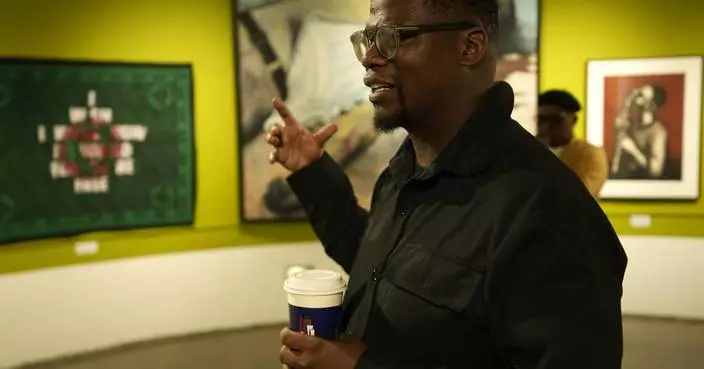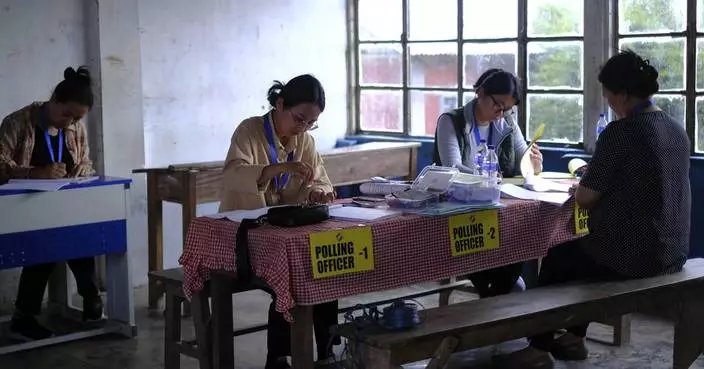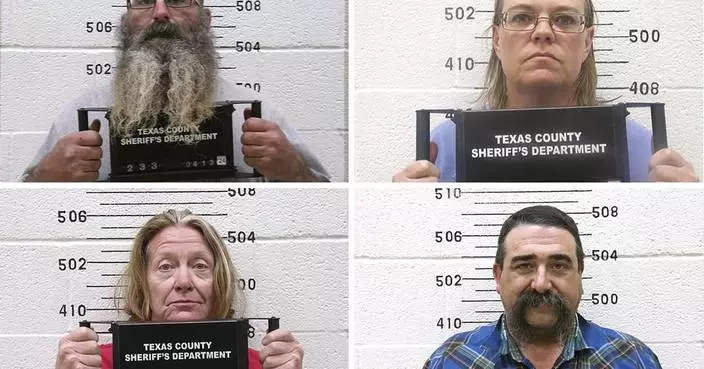Wiping tears from her cheeks, the young woman describes how she has resorted to prostitution to feed her children.
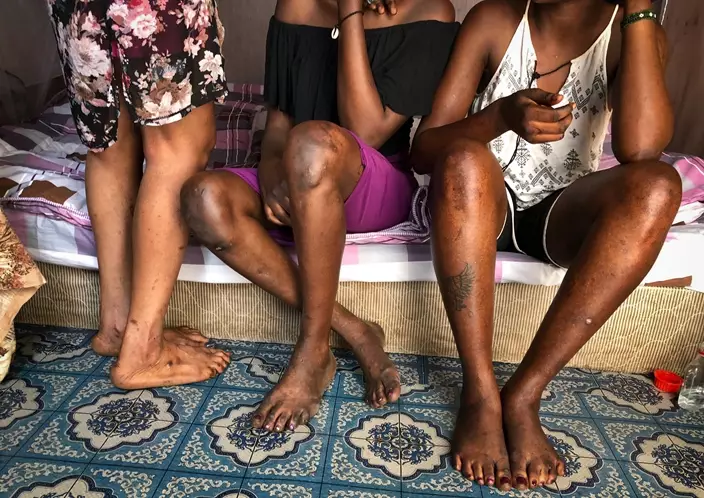
In this photo taken Monday, March 5, 2018, three sex workers sit in their brothel in Juba, South Sudan. (AP Photo)
When South Sudan's civil war broke out in 2013, her family fled their home to avoid violence. Her husband took her and their two children to a U.N. camp for safety. He has not been seen since then and is presumed dead. Bright and resourceful, she found offers of work as a cleaner and a waitress, but she said her male employers demanded sex.
"If you refuse to sleep with them, you'll never get a job," said Nancy, who spoke on condition of not publishing her full name.
"They'll tell you to come tomorrow for work but then start calling you the night before asking to sleep in your house," she said of the hiring managers. If she didn't respond to their demands, she'd show up to work the next day only to find that another woman had taken her place.
In three years, four bosses threatened to fire the young mother unless she had sex with them, she said. One of them told her it was "company policy," she said.
After such exploitation Nancy said she decided to do sex work, where she said she has more control and makes more money to care for her children, who are now aged 4 and 7. She said she goes to bars where she picks up clients.
"I'm embarrassed," she said, her eyes darting to the floor. "But it's my only way out."
Nancy never reported her aggressors because she thought the authorities wouldn't believe her. "I would just go home and cry," she said.
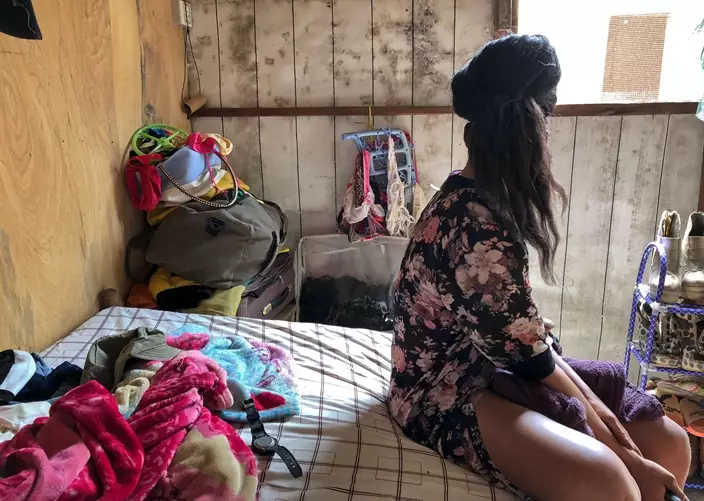
In this photo taken Monday, March 5, 2018, sex worker Irene sits in her brothel in Juba, South Sudan. (AP Photo)
As International Women's Day is being marked across the globe, South Sudan remains a country where women face grinding difficulties. While women across much of the Western world have galvanized around the #MeToo movement by speaking out against sexual assault and letting women know that they're not alone, most women in the fledgling nation of South Sudan remain voiceless.
"It's a culture of silence," says Shelina Doro, a women's protection officer with the United Nations. Most women don't want to speak out for fear of reprisal, she said.
Violence against women in South Sudan is twice the global average, with 65 percent of females experiencing physical or sexual abuse in their lifetime, according to a study by the International Rescue Committee and the Global Women's Institute.
Violence against women has escalated during South Sudan's civil war, with rape being used as a weapon of war with impunity, according to many human rights groups. Gender experts say the war has magnified preexisting inequities.
"Sexual exploitation is a manifestation and glaring symptom of deep-rooted gender inequalities," said Renifa Madenga, former gender adviser to South Sudan's Commission on Human Rights. The war has reinforced the power and control of men across the country, she said.
It is not just South Sudanese men who are sexual predators. Last month, the U.N. in South Sudan recalled a peacekeeping police unit of foreign soldiers after some members reportedly engaged in "transactional sex" with women living in a civilian protection camp.
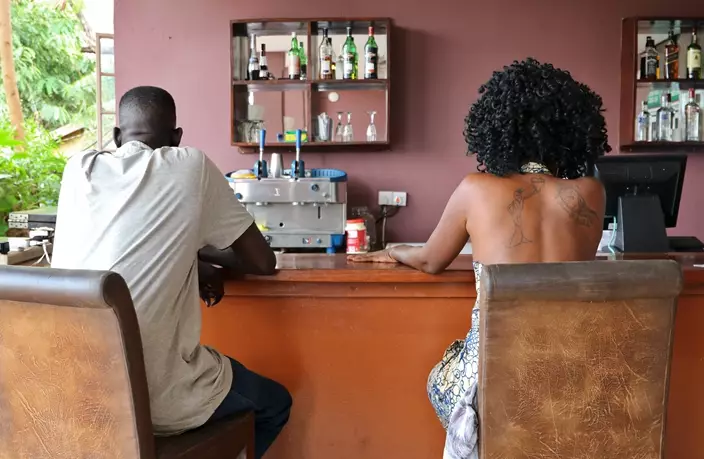
In this photo taken Friday, March 2, 2018, sex worker Nancy sits at a local bar where she sometimes picks up clients, in Juba, South Sudan. (AP Photo)
South Sudan's government encourages women to report any type of harassment, but officials say most women aren't aware of their rights. Last year no reports were filed of sexual assault in the workplace, said James Simon, senior inspector in the Ministry of Labor.
"Women tell me the government doesn't give them rights, but these are human rights and most of them don't know that," said Pita Rosalie, a social worker with the Ministry of Gender.
Rights groups are pushing campaigns like #MeToo and #HerToo to go further than spreading awareness and to focus on advocacy and action, especially across Africa where the movement has yet to gain steam.
"Ultimately the campaign that has empowered many, can help empower an effort to create an African solution to what surely is a global problem and ensure that no one is left behind," said Cormac Smith, advocacy officer at Southern African Liaison Office, a South African-based rights organization, to The Associated Press.
Even though some women are fighting for a seat at the table, more than awareness is needed, said Funmi Balogun, a women's rights activist working with U.N. Women in South Sudan.
South Sudan is "patriarchal, militarized and in conflict," said Balogun. "I doubt if #MeToo would gain any traction at this point or even in the near future."
LONDON (AP) — Actor Paola Cortellesi has long been a staple on the Italian pop culture scene, mostly known for her work as a comedian. Then she turned to directing and her first feature movie, “There’s Still Tomorrow,” took Italy by storm.
The black-and-white film about an ordinary woman trapped in a toxic marriage in post-World War II Italy opened in October. The low-key drama resonated with women from all walks of life, even overtaking the global hit “Barbie” at the Italian box offices.
After its whirlwind success at home, the movie launched internationally and opens in the United Kingdom on Friday. Cortellesi was in London earlier in the week to promote “C’e’ Ancora Domani,” as the movie is titled in Italian, in which she also stars in the lead role.
With a bright smile contrasting her elegant black suit, white shirt and hoop-like black glasses, Cortellesi, 50, stopped by The Associated Press to chat about her unexpected success.
"Thankfully, the camera is high, so you don’t see my double chin,” she joked as she sat down.
Her signature mix of fun and serious talk soon became apparent as Cortellesi confessed she didn’t have high expectations for the film — monochrome cinematography and old-fashioned storylines are not popular at the box office these days.
But there was something especially captivating in the drama unfolding on the screen between Delia — the main character in “There’s Still Tomorrow,” played by Cortellesi — and that of her husband Ivano, played by Valerio Mastandrea.
“We heard of queues outside the cinema, something that never happens," Cortellesi said. “My friends started sending me pictures from all over Italy of people queuing. I heard of sold-outs."
As the revenue numbers soared, Cortellesi's interactions with the audiences at the end of the screenings brought even more satisfaction.
“They wanted to talk, to tell me a little about the story that had touched them and how this story could be about them," she said.
The movie's Delia is physically assaulted by her husband but Cortellesi also brings other kinds of abuse to light — verbal, psychological and financial — and depicts how a victim is often isolated by an abuser as a way of denigrating them further.
Modern audiences have connected with the movie, she said, because the traits of a toxic relationship are recognizably the same nearly 80 years later.
“The dynamics repeat themselves. They are the constants,” she said. “Often women do not report abuse because they are not economically independent, they would not know what to do."
It is the contemporary parallels of this tragedy that Cortellesi believes made the movie a success. A woman in an abusive relationship could maybe consider running away from this situation, but it’s not easy, especially if she has children.
“We must also understand that it’s very complicated,” Cortellesi says.
She says not only women but men, too, respond to her movie. On the day of its release in Italy, Cortellesi recounts how she was greeting the audience after a later showing and met an older man in the crowd.
“He told me, ‘I’m watching it for the second time.’ So I told him that's not possible ... it just opened today,” she recounted. "He said, ‘I was at the show before, now I’m back. I found a seat and I’m watching it again.'”
Like Delia in the movie, Cortellesi is a mother. One time, as she was reading a children's book about women’s rights to her 11-year-old, Laura, she recalls her daughter's reaction.
“She didn’t know that women had practically no rights before and so she asked me incredulously, talking about divorce, talking about abortion, talking about the vote, talking about whatever, she said ‘No, but why? Really?’ and it was wonderful to see her so amazed,” recalls the director.
“We must fight, be aware of our rights and fight to defend them,” Cortellesi added.
In taking her movie around the world, Cortellesi says she is learning how the subject of women's rights affects people in different countries in different ways — in some places, women have been emancipated longer than in Italy.
Her moment of hope?
Cortellesi said she read about young girls, as they were leaving the movie theater after seeing her film, commenting that they want to “practice freedom.”
“Their own freedom and that of others others,” she said, smiling.
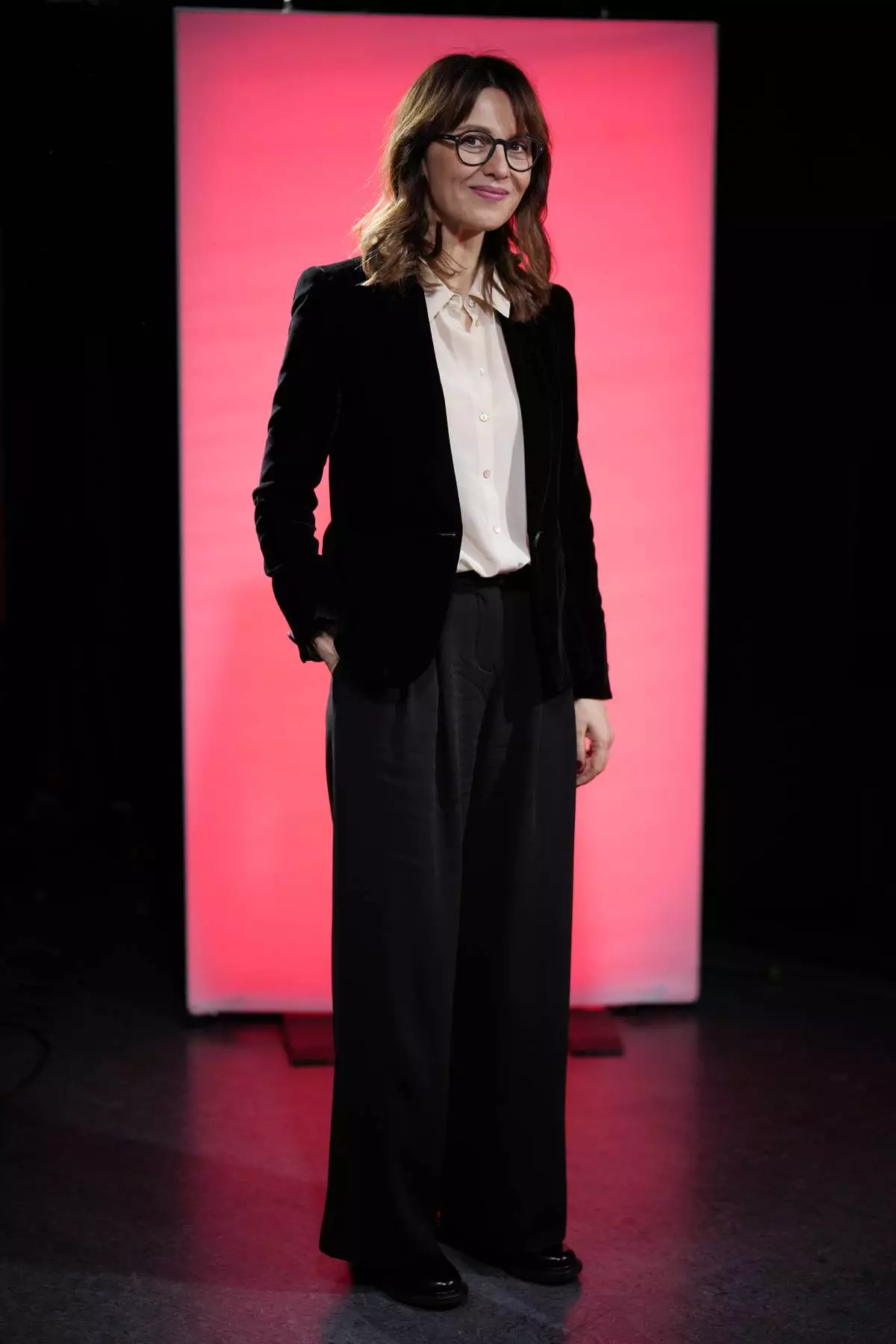
Italian director and actress Paola Cortellesi poses for a photograph during an interview in London, Monday, April 22, 2024. Paola Cortellesi is a staple of Italian pop culture known for her work in front of the camera and her talent as a comedian. Recently she took on a new challenge, directing her first feature movie titled “There’s Still Tomorrow”. The black and white movie about a woman stuck in an abusive marriage in post-war Italy, debuted in October 2023. After achieving incredible success in the motherland, where it beat global box office smash “Barbie," it is released in the U.K. Friday. (AP Photo/Kin Cheung)

Italian director and actress Paola Cortellesi poses for a photograph during an interview in London, Monday, April 22, 2024. Paola Cortellesi is a staple of Italian pop culture known for her work in front of the camera and her talent as a comedian. Recently she took on a new challenge, directing her first feature movie titled “There’s Still Tomorrow”. The black and white movie about a woman stuck in an abusive marriage in post-war Italy, debuted in October 2023. After achieving incredible success in the motherland, where it beat global box office smash “Barbie," it is released in the U.K. Friday. (AP Photo/Kin Cheung)








